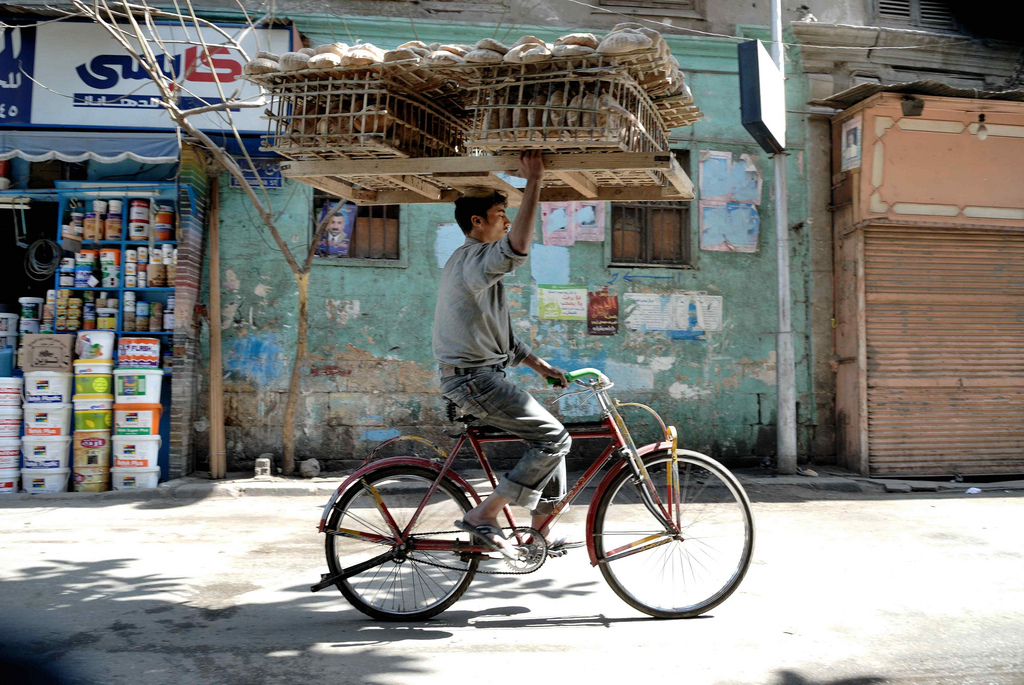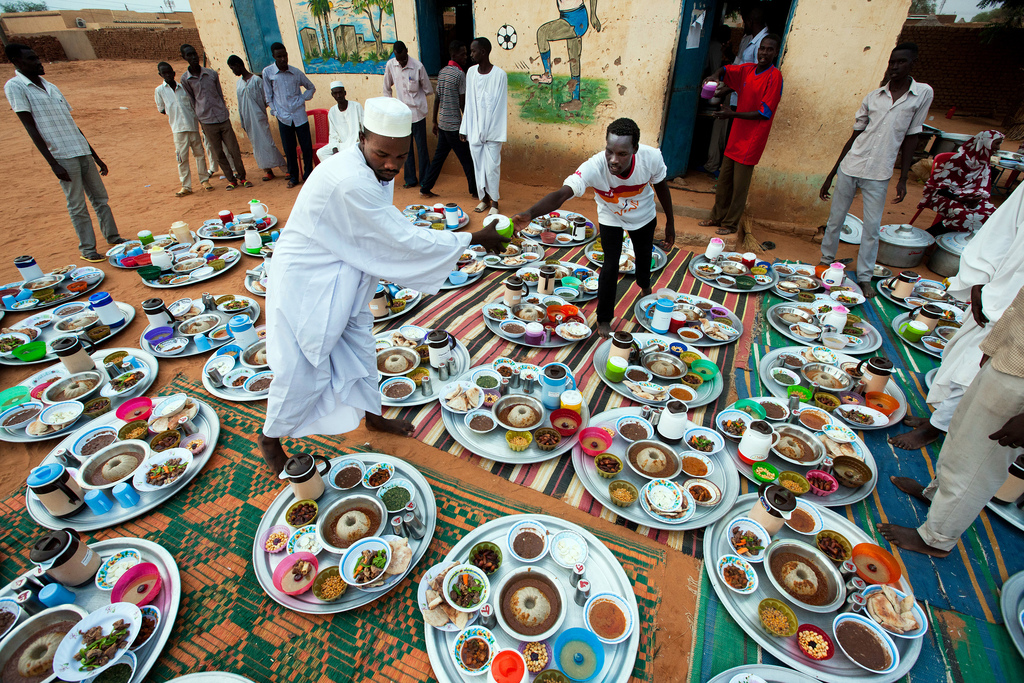To feed the world’s growing population in a sustainable and inclusive way with good quality food is one of the main tasks for our time. The solution lies partly at the local level: the livelihoods, and the cultural, socioeconomic, and environmental circumstances in which food is produced, processed and distributed. But how can or should global actors be involved? The outcomes of the debate on food security, published by The Broker, can help to find the answers to these questions, with recommendations for a new research agenda on food security.
‘Food security is a global public good.’ That is how The Broker started the debate on food security in January 2013, which The Broker initiated in cooperation with the Dutch Food and Business Knowledge Forum, a new knowledge platform initiated by the Dutch Ministry of Foreign Affairs.The challenge of securing food supplies at local, national and international levels is a global commons problem that requires a multi-level strategy. The question, however, is where to start, what priorities can be distinguished, and how policies and research on food security can be more effectively used – especially by practitioners.
The task of securing food and nutrition worldwide is multidisciplinary. Access to food, food distribution and food production are all important, and cannot succeed independently. They are closely linked to other developments, like socio-cultural influences (religion, gender, family), environmental challenges (land, water, climate, biodiversity), economic issues (value chains, prices, profits, finance capital), and political forces (regulations, subsidies, policy guidelines).
In other words, the food system as a whole – from the inputs, primary production, processing and manufacturing of food, to distribution, logistics, retail and domestic food preparation – has to be placed in context and studied along with its external influences and outcomes.
Consultation for a food secure world
The Broker hosted a lively debate on the future knowledge and research agenda to secure food and nutrition security (see our dossier on food security). This resulted in 40 blog posts and 23 comments. The debate continued on other online fora. The synthesis of this debate, in which over 90 international experts participated, is divided into two articles. The first article focuses on what a comprehensive and inclusive knowledge agenda secures good quality food for the growing world population should look like and what actors should be involved. The second article digs deeper into how the private sector as an actor can be involved to achieve food and nutrition security policies that are comprehensive and inclusive. This final article summarizes the recommendations for a comprehensive new knowledge and research agenda on food and nutrition security.

Local and regional farming systems
Securing good quality food in sufficient quantities starts with an integrated food system: from production, distribution and processing, to the end-users. Such a food system can only function well if there is sufficient knowledge about all the stages: who is linked with whom and how. Traditionally the focus in food security is on linking production with distribution and processing industries, and less on retailers and the end-users. This is also the outcome of the debate; the contributors focused was mainly on the local level and how small-scale farmers can be part of (formal) food markets, mainly regionally, in a sustainable way.
The starting point is the local food system. Food security policy and research, according to the participants in The Broker’s debate, should therefore focus on a resilient society in which the population is able to fend for itself. The debate on how to achieve this concentrated on the role of Public Private Partnerships (PPPs). Stakeholders involved in PPPs should be more aware of the local livelihoods, cultural and environmental circumstances, in which small-scale farmers produce food (e.g. read the articles of Sylvia Kay (Transnational Institute), Bruce Byiers (ECDPM), Lawrence Bategeka (EPRC), Stephan Manning (University of Massachusetts Boston)). Farmers’ organizations, cooperatives or producer organizations need to participate in such partnerships with the public and private sector. But to be able to do so, they need better access to knowledge (read Mainza Mugoya (EAFFU), Myra Wopereis-Pura (independent consultant)), capital, natural resources like land and water, and policy-makers.
Current value chain approaches, however, overestimate efficiency and investments in agro-businesses. The problem of such approaches is that they have problems including small-scale farmers in formal markets, and can even can harm the creation of resilient and inclusive food markets. The participants in the debate therefore emphasize the need to find ways to secure inclusive partnerships and cooperation between the stakeholders in the food chain.
Such a development strategy – in which food and nutrition security are embedded – starts with a focus on local socioeconomic, cultural and environmental dimensions, for example to encourage the preparation of local dishes by chefs, for school meals, and in the tourist sector. Private sector involvement, therefore, should not focus exclusively on the big agribusinesses, but should find ways to invest in smaller-scale, less sophisticated methods of delivering added value that suit small agricultural businesses, like storage, transport, tools, primitive processing equipment, ICT services, micro-finance, and knowledge transfers.
Global context
If building resilient and inclusive local food markets is the aim, policies to enable this should take the macro level players into account. So it is not only about linking smallholders with the input industry (seeds, fertilizers etc.), local traders, transport and processing sector, and knowledge institutes. On the macro level, too, many actors intervene and have an influence on the entire food system. For example the financial sector, retailers, and other sectors in rural areas, like tourism and extractive industries.
Some participants mentioned the risk of biofuels for food production and access to land, as they are one of the drivers of the global land rush. Others mentioned the way extractive industries and the tourism sector can coexist with agriculture in the same area. A factor not mentioned in the debate but increasingly important is the increasing purchasing power of retailers. If they are not included in partnerships, one of the most powerful actors in the food chain will not be involved. And this is not solely the case for Western retailers, supermarket chains are increasingly powerful market actors in the food chain in emerging countries, too.
The involvement of financial markets and their impact on food production is another issue that is increasingly important. Speculative agricultural commodity futures markets result in high and volatile food prices. The financial sector is heavily involved in deals around ‘land grabs’ and spurs land speculation that has an impact on the food production and access to land of small-scale farmers. (The inclusion of large retailers and the financial sector in food security policy and research was not mentioned in the debate, but has been added in this conclusion to give a more complete picture of macro-level actors.)

Comprehensive knowledge and research agenda
To link the local with the global and vice versa is essential for food and nutrition security. And to understand better how to do this in an inclusive and sustainable way means a comprehensive knowledge and research agenda on food security. We know now that things are interrelated, but what exactly happens in detail and under what local, regional, and global circumstances is not yet clear. In particular, more evidence is needed on the impact of private sector involvement and partnerships between farmers and entrepreneurs on food security and farmers’ livelihoods. Furthermore, research results should not only be translated into recommendations for policies, but be made useful for practitioners in the field (entrepreneurs and farmers).
The role of civil society and local governments should also be studied. This implies participation and a bottom-up approach. Now investments in food security are mainly channelled through national policies and centralized negotiations, however, decisions should be made within a participatory local democracy. It is a dynamic process between elected representatives and grassroots civil society. Youth, women, farmers, herders, traders, all need their own associations with the freedom to set their own priorities and fight for them through deliberative local processes (read for example John Coonrod (Hunger Project) and Claudio Schuftan (independent consultant)). Research on food security should therefore also take into account the creation of such participatory local democracies.
This brings us to the final conclusion: the role of international donor countries, multilateral organizations and international NGOs. How can they promote better and inclusive PPPs? How can they improve impact measurement? How can they not only improve investments that go through the public window, but also set standards for all investments that go through the private window? How can international trade and investment policies be coherent with food security and nutrition? Furthermore, national and regional agricultural policies (like the EU’s common agricultural policy ) or policies on biofuels need to be in line with food and nutrition security. Furthermore, what role does the government and international community play in securing efficient knowledge transfers? Answers depend on better knowledge and future research approaches that can bring food and nutrition security closer.
Recommendations for a research agenda
Recommendations for a comprehensive knowledge and research agenda on food security and nutrition, based on the outcomes and analysis of the online debate:
Local level:
- Focus on improving small-scale farmer production;
- Develop new partnerships between small-scale farmers (including female farmers) and local entrepreneurs;
- Develop models for urban and peri-urban agriculture that are of value to the urban poor;
- Focus on ways in which regional economic integration processes can stimulate efficient food distribution;
- Include accessibility of renewable energy in rural areas within the integrated food security approach;
- Develop new business models that suit small-scale farmers and that take the livelihoods of local people into account;
- Understand the extent to which producer organizations should focus on economic advantages for their farmers or strengthen the community;
- Research should take into account the creation of participatory local democracies;
- Study the constraints to the access to knowledge by farmers;
- Develop a framework in which inclusive rural development starts with local cultural values.
Global level:
- Develop an integrated approach to food pricing that includes the full costs of natural resource use from food production, over-use and exploitation of these resources over time;
- Study value chain approaches through a ‘nutrition’ lens;
- Focus research on land grabbing and biofuels more directly on food security;
- Look at knowledge management and sharing in Africa and develop new ways to improve knowledge transfers;
- Study the politics and power relations surrounding food security and nutrition policies;
- Focus on better insights into the incentives and capabilities of the (potential) trading partners;
- Study the role of consultants: go for low-risk projects instead of high-impact projects;
- Research how partnerships can be extended beyond sectors (e.g. extractive sector, tourism sector, ICT sector);
- Monitor under what circumstances and conditions PPPs are inclusive;
- Understand the transformation process of agricultural and rural development in which most of the current 500 million smallholder farms will have to find food secure work opportunities.
Photo credit main picture: Neil Palmer, International Center for Tropical Agriculture / As part of the Farms of the Future project, CCAFS together with researchers at Oxford University, have been working to identify areas of western Nepal that are currently experiencing the expected future climate of Beora, a small farming community in Rupandehi District. The project involves a series of farmer exchanges, in which farmers from Beora will visit their “future climates”, to help them learn about how communities cope with higher temperatures and different rainfall patterns.
